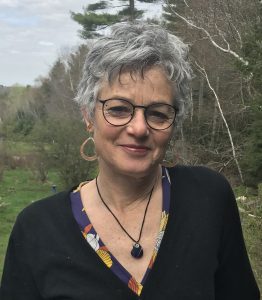 Catherine Sands has over 25 years of experience as an evaluation and education leader in food systems and policy change. Catherine founded Fertile Ground as a farm to school partnership between the Williamsburg Elementary School and Nuestras Raíces, an urban agriculture organization. She grew the organization to support farm to school design in over 10 school districts in MA, then to become a broader strategy and impact technical assistance provider. Catherine has played a key role in local and regional food systems and policy change by developing cross-sector partnerships, conducting strategic planning and equitable evaluation, and building transformational leaders. Catherine believes in the power of communities to construct their own values-driven assessments and evaluation. As an impact specialist in participatory methods, she has coached over thirty community food projects in their evaluations and in using this evidence to influence policy change.
Catherine Sands has over 25 years of experience as an evaluation and education leader in food systems and policy change. Catherine founded Fertile Ground as a farm to school partnership between the Williamsburg Elementary School and Nuestras Raíces, an urban agriculture organization. She grew the organization to support farm to school design in over 10 school districts in MA, then to become a broader strategy and impact technical assistance provider. Catherine has played a key role in local and regional food systems and policy change by developing cross-sector partnerships, conducting strategic planning and equitable evaluation, and building transformational leaders. Catherine believes in the power of communities to construct their own values-driven assessments and evaluation. As an impact specialist in participatory methods, she has coached over thirty community food projects in their evaluations and in using this evidence to influence policy change.
Catherine also coaches and supports groups to understand the impact of systemic racism and to recognize and disentangle how white culture influences and harms networks, predominantly white-led nonprofits, and higher education. She teaches food justice and policy in the Sustainable Food and Farming Program at UMASS Amherst.
Catherine holds a BA from Georgetown University in Art History and English and a Master’s degree from the University of Massachusetts Amherst School of Public Policy. Catherine has also worked on development and marketing teams for arts organizations, produced rock concerts and other events to raise awareness about environmental issues, and choreographed, performed and taught dance. She loves to cook for family and friends and rows with a club team on the Connecticut River.
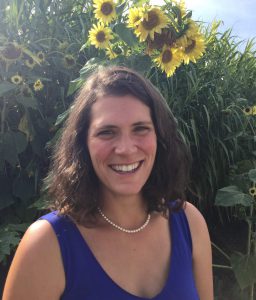
Laura Fries has a BA from Oberlin College in Comparative Literature and Spanish. After receiving her degree, Laura realized her passions lay in food, nutrition, and food justice. This led her to return to school to pursue a Master’s degree in Public Health in Community Health Education from University of Massachusetts Amherst. Since then, she has taught nutrition workshops and college courses, and participated in grant evaluations.
Laura also collaborated with her sister, a farmer, to design, secure funding for, and run an educational summer program for children. Laura’s interest in food is personal as well as professional. She loves to travel and try new things. So far, tripe and sea urchin are the only foods she’d rather not try again.
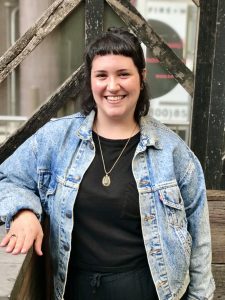
Kristen Whitmore is an organizer, evaluator, and researcher based in Northampton, MA. She has spent the past decade working to foster vibrant and equitable community food systems, collaborating with farmers, students, and community members in New England and in Latin America. Kristen uses participatory and community-based praxis and is committed to movements for racial, economic, and environmental justice. She holds a bachelor’s degree in Sociology and Gender Studies from Mount Holyoke College and a master’s degree in Regional Planning from the University of Massachusetts Amherst. She currently works as Special Projects Coordinator at Healthy Hampshire & the Collaborative for Educational Services, Evaluation Associate at Fertile Ground, and researcher/PhD student at UMass Amherst. Raised in western Massachusetts by a family of farmers, lunch ladies, and truck drivers, she has spent most of her life thinking about food, the land it’s grown on, the people who move it around the world, and most importantly, what’s for dinner!
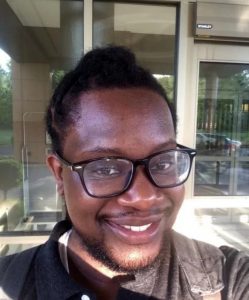 Terrell James is committed to grassroots organizing in his hometown of Springfield, MA. He is interested in the ways in which Black and LGBTQ youth struggle for change within their community. He has worked in Springfield Public Schools and has facilitated many different youth groups focused on social justice.
Terrell James is committed to grassroots organizing in his hometown of Springfield, MA. He is interested in the ways in which Black and LGBTQ youth struggle for change within their community. He has worked in Springfield Public Schools and has facilitated many different youth groups focused on social justice.
When Terrell was in middle school he learned about food justice and food systems from his youth garden work at Gardening the Community. Through this work he began to think about the connections between racism and class inequality in Springfield. Participating in Gardening the Community kickstarted his interest for social change in Springfield.
Terrell is a PhD student in the Anthropology department at UMass Amherst. There he teaches social justice and critical service-learning courses. He is also committed to community-engaged and community-based practices and research methods with youth. Terrell practices traditional Black diasporic contemplative and spiritual practices and enjoys making vegetarian soul food.
Facilitation Partners
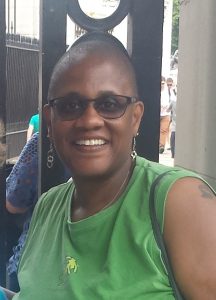 Carol Stewart’s background includes more than 14 years of conflict management work in New York City where she worked in community-based mediation programs as a mediator, a trainer, and as an administrator. Empowering people to make decisions for themselves — helping them to clearly think about their options and leaving the decision making up to them — has been and continues to be a hallmark of her work. Carol is a certified member of the International Ombudsmen Association and a current member of the Association for Conflict Resolution. She is currently the Director of Staff Diversity and Inclusion Initiatives at Mount Holyoke College. Carol holds a Master’s degree in Public Policy and Public Administration from University of Massachusetts Amherst with a concentration in Social Justice Education and lives in Springfield, MA with her spouse and their son.
Carol Stewart’s background includes more than 14 years of conflict management work in New York City where she worked in community-based mediation programs as a mediator, a trainer, and as an administrator. Empowering people to make decisions for themselves — helping them to clearly think about their options and leaving the decision making up to them — has been and continues to be a hallmark of her work. Carol is a certified member of the International Ombudsmen Association and a current member of the Association for Conflict Resolution. She is currently the Director of Staff Diversity and Inclusion Initiatives at Mount Holyoke College. Carol holds a Master’s degree in Public Policy and Public Administration from University of Massachusetts Amherst with a concentration in Social Justice Education and lives in Springfield, MA with her spouse and their son.
Catherine Sands and Carol Stewart work together through Partnership in Practice, a collaborative consulting group that provides strategic planning, research and evaluation, facilitation and mediation to community groups, nonprofits, educational institutions and municipalities.
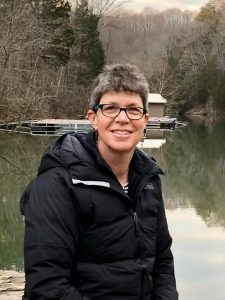 Anne Richmond has over 30 years of experience as an anti-racist organizer in grassroots movements for social change. Over the past decade, she has focused on creating a more equitable and racially just food system in Springfield and the Western MA region. As the former Co-Director of Gardening the Community (GTC), a youth-centered food justice and urban agriculture organization, Anne helped the organization grow its funding base and community impact while clarifying its anti-racist commitments, structures and practices. She also worked as Grantmaking Organizer with Haymarket People’s Fund, a social justice funder in New England, where she participated in a transformational 10-year change process that shifted the organization from white led to BIPOC led. Anne also organized for a decade in the battered women’s movement on both local and statewide levels.
Anne Richmond has over 30 years of experience as an anti-racist organizer in grassroots movements for social change. Over the past decade, she has focused on creating a more equitable and racially just food system in Springfield and the Western MA region. As the former Co-Director of Gardening the Community (GTC), a youth-centered food justice and urban agriculture organization, Anne helped the organization grow its funding base and community impact while clarifying its anti-racist commitments, structures and practices. She also worked as Grantmaking Organizer with Haymarket People’s Fund, a social justice funder in New England, where she participated in a transformational 10-year change process that shifted the organization from white led to BIPOC led. Anne also organized for a decade in the battered women’s movement on both local and statewide levels.
Currently, Richmond trains, coaches and supports white individuals and predominantly white organizations in the work of becoming accountable, anti-racist organizers and building humane and equitable organizational culture and practices. She is a member of the leadership team of UROC (Undoing Racism Organizing Collective) of Western Mass. and a trainer and organizer with the People’s Institute for Survival and Beyond. She is also a beginning farmer. She believes that white people and communities must face the legacy of racism in the US and collectively address the ways that white supremacy manifests in our institutions and lives in order to regain our full humanity. Anne has a MS in Community Economic Development from Southern New Hampshire University and a BA from Oberlin College. She loves to grow food, cook with family and friends and travel. Originally from Cincinnati, Ohio, Anne and her family have made Springfield, MA their home.